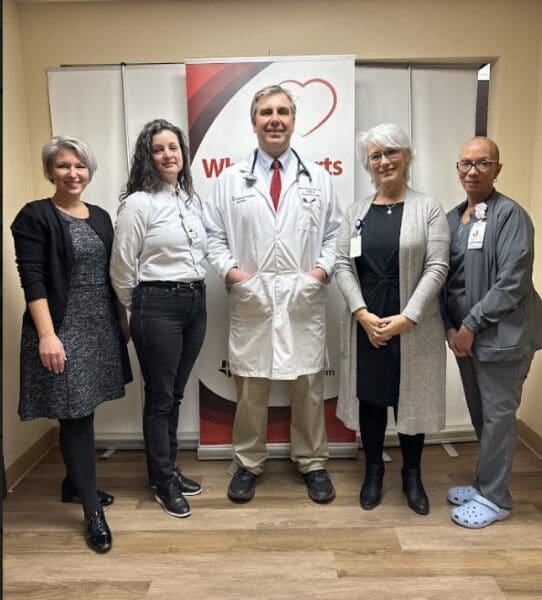The Heart Group Will Provide Space for Patients, Families to Learn and Share
Trinity Health System’s Heart Center will launch today the Hope with Heart Failure Support Group for patients and their support partners (e.g., families, caregivers).
Dena Kinsey, University of Kentucky Graduate Student, Social Work, will serve as facilitator of the group.
COVID complicated healing journeys
In recent years, providers at Trinity Health System’s Heart Center have seen the need for a patient support group, Kinsey said.
The COVID pandemic led to a multitude of mental health challenges that have complicated the healing journeys of patients with heart disease. And because of the pandemic, many support groups were discontinued or were moved online.
“Isolation runs in the depths of depression and anxiety which can directly affect readmission rates in cardiac patients,” Kinsey said. “Patients need other people to help them heal, to know they are not alone. Patients need a place to refill their cups, so to speak.”
A complement to provider care
Kinsey said the support group will complement the care patients and their families are already receiving at Trinity Health System’s Heart Center by employing a whole-person or integrated behavioral-health approach.
“Cardiologists at Trinity Health System understand that they’re treating a person, not simply the heart,” Kinsey said. “People are complex organisms with interconnecting systems, and one system has the potential to affect other systems.”
The Hope with Heart Failure Support Group will give patients and their families a space in which they can learn and grow together, while sharing the challenges of living with heart disease. Furthermore, it will be a space in which compassion is shown to these individuals.
“We are dealing with the physical sense of the heart and mind and also the metaphorical heart and mind,” Kinsey said.
Motivated by personal experience
Kinsey said she’s fueled, in part, by the struggles she has witnessed within her own family.
“Many of my family members and friends have heart disease, including my grandparents and parents and my husband’s parents and grandparents.”
While she was pursuing her undergraduate degree in social work at Ohio University, Kinsey was able to work with other families who were also navigating the challenges of heart disease.
“I have seen on a very personal level one individual who had no medical training or background struggle to understand the complexities of his disease,” she said. “I traveled with this individual through his journey at hospitals, interventions, healing at home, ambivalence, and many behavioral challenges that complicated his trajectory.”
These connections have given her a nuanced perspective on the fear and confusion heart patients experience as they struggle to recover.
The support group will be positive and constructive
As facilitator of the Hope with Heart Failure Support Group, Kinsey will oversee the content of each meeting and the creation of goals and objectives, while nurturing a positive, constructive culture.
Each session will be formatted as follows:
- Welcome and Introductions: Any business or announcements that need to be provided.
- Data Collection
- Speaker: 15 to 30 minutes on a topic of their choosing, albeit one that pertains to heart disease.
- Time for Clarification: Members will have an opportunity to ask questions of the speaker and seek clarification of the information presented.
- Mental Health Component: The first support group will focus on stress management; members will have a chance to learn about strategies and tools for dealing with stress, while also being allowed to share what works for them.
- Support Group Socialization: This space will give members a chance to share anything outside of what is being discussed.
- Conclusion: Go over key points from the meeting and allow members to share how they will implement these tools and knowledge into their lives until the next group meeting.
The first speaker will be John Schirger, MD, Director, Hope With Heart Failure Clinic.
Future speakers will represent all those involved with a patient’s heart care (e.g., Cardiology Specialist, Cardiac Rehabilitation, Nurse Practitioners, Physician Assistants, Nutritionists, Case Management, Pharmacology, and Mental Health).
A patient can join the Hope with Heart Failure Support Group by simply attending and participating. For more information on how to join, please contact the Heart Center at Trinity Health System by calling 740-264-8020.
“Support groups have the ability to bridge gaps between medical care and emotional healing,” Kinsey said. “The educational component will give patients and family members additional information and hopefully bring a more comprehensive understanding of their heart disease.”
If you would like to interview Dena Kinsey, please contact Laurie Labishak using the information at the top of this press release.
####
About Trinity Health System: Trinity Health System is a faith based, Catholic health system with the largest footprint in the region serving Jefferson, Harrison, Tuscarawas, Belmont and Columbiana counties in Ohio with locations in Hancock County in West Virginia and Allegheny County in Pennsylvania. Trinity Health System is part of CommonSpirit Health, a nonprofit, Catholic health system dedicated to advancing health for all people. It was created in February 2019 through the alignment of Catholic Health Initiatives and Dignity Health. CommonSpirit Health is committed to creating healthier communities, delivering exceptional patient care, and ensuring every person has access to quality health care. With its national office in Chicago and a team of approximately 150,000 employees and 25,000 physicians and advanced practice clinicians, CommonSpirit Health operates 142 hospitals and more than 700 care sites across 21 states. In FY 2018, Catholic Health Initiatives and Dignity Health had combined revenues of $29.2 billion and provided $4.2 billion in charity care, community benefit, and unreimbursed government programs. Learn more at commonspirit.org.


